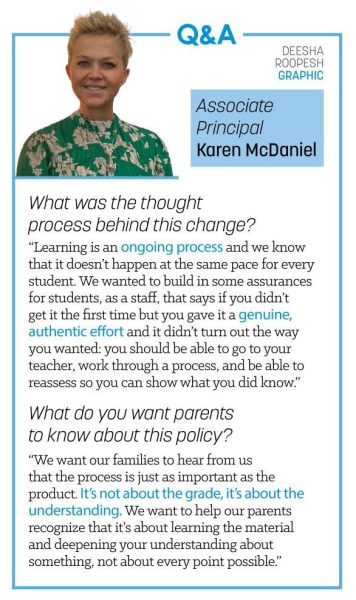Ahead of the 2023-2024 school year, this school has made changes to its reassessment policy. Most notably, the new reassessment policy allows for retake opportunities for test grades below an A- (90%, the designated “mastery score”), and retake scores will be accepted up to 100%.
Associate Principal Karen McDaniel, who has spearheaded this new policy, said, “We don’t want teachers averaging two grades together. That’s not a clear representation of your new learning.”
While McDaniel said reassessment policies may vary across the building and in different departments, she noted that the policy ensures that reassessment opportunities will stay consistent for the same class, even under different teachers.
Explaining how reassessments look different based on each class, McDaniel said, “We were comfortable telling teachers, ‘Okay, here’s the reassessment policy for the school,’ but some aspects are up to each Professional Learning Community and depend on each class. For example, U.S. history teachers would create reassessment guidelines for those classes that are consistent and fair. We also recognize that reassessments would look different in a world language class than a math class for example.”
McDaniel also said students critiqued the reassessment policy which led to the change in policy this school year.
“The conversation about reassessment started with students throughout last year,” she said. “We kept hearing from students that reassessments didn’t seem very consistent, and that didn’t feel fair. Even within the same department with different teachers, policies could vary wildly, and that didn’t feel fair or consistent.”

“Then we sat down with a group of administrators and department heads, and dug in to reassessment policies of other high schools in the country that are similar to ours and we found some really good fits.”
Honors chemistry teacher Scott Seymour discussed the changes honors chemistry teachers made to their reassessment policies.
“We all had to update our policies,” he said. “In prior years in honors chemistry, we did not allow for reassessments on the tests but for our daily homework quizzes (only), but now it’s the opposite. That’s the major change.”
Seymour also described how students can qualify for reassessment.
“We decided to collect the homework for each unit in the case that a student may need a retake. To qualify for a test reassessment, you would have had to correctly complete 75% of the homework to show you attempted to master the material the first time,” Seymour said. “Our thought process as teachers is that if a student is prepared for a test they shouldn’t need a reassessment, so that is our focus.”
With the changes, Seymour said he still has some concerns with the new policy.
“The only thing we’re concerned with is when students go off to college, there’s no reassessments,” he said. “Are we setting people up for success by allowing reassessments? In college, students don’t get that luxury, that’s just the reality of it.”
For her part, Junior Jewel Wang said it was time for a change in policy.
“I’ve had friends in the same classes as me, but with different teachers, and our reassessment policy was a lot different compared to theirs, and that was problematic,” she said. “I think it will benefit students learning. Sometimes, if you did bad on a test, there’s no retake, so you never get a chance to actually fully learn the material.
“My only worry is that there may be more competition among students with more retakes available.”
McDaniel said the goal of the new policy is to move away from the idea of assessments simply being about points, but rather how well students understand what they are tested on.
“Sometimes it’s unhealthy for some kids, where they get 92, 93, and they think, ‘I have to make 99, I have to make 100,’” McDaniel said. “No, you don’t. You’ve proven to us, (and) we’ve told you that mastery is an A. We’re not going to try to keep going in a points-grabbing kind of scenario. It’s truly about grasping concepts instead of points.”

































![AI in films like "The Brutalist" is convenient, but shouldn’t take priority [opinion]](https://hilite.org/wp-content/uploads/2025/02/catherine-cover-1200x471.jpg)








































![Review: “The Immortal Soul Salvage Yard:” A criminally underrated poetry collection [MUSE]](https://hilite.org/wp-content/uploads/2025/03/71cju6TvqmL._AC_UF10001000_QL80_.jpg)
![Review: "Dog Man" is Unapologetically Chaotic [MUSE]](https://hilite.org/wp-content/uploads/2025/03/dogman-1200x700.jpg)
![Review: "Ne Zha 2": The WeChat family reunion I didn’t know I needed [MUSE]](https://hilite.org/wp-content/uploads/2025/03/unnamed-4.png)
![Review in Print: Maripaz Villar brings a delightfully unique style to the world of WEBTOON [MUSE]](https://hilite.org/wp-content/uploads/2023/12/maripazcover-1200x960.jpg)
![Review: “The Sword of Kaigen” is a masterpiece [MUSE]](https://hilite.org/wp-content/uploads/2023/11/Screenshot-2023-11-26-201051.png)
![Review: Gateron Oil Kings, great linear switches, okay price [MUSE]](https://hilite.org/wp-content/uploads/2023/11/Screenshot-2023-11-26-200553.png)
![Review: “A Haunting in Venice” is a significant improvement from other Agatha Christie adaptations [MUSE]](https://hilite.org/wp-content/uploads/2023/11/e7ee2938a6d422669771bce6d8088521.jpg)
![Review: A Thanksgiving story from elementary school, still just as interesting [MUSE]](https://hilite.org/wp-content/uploads/2023/11/Screenshot-2023-11-26-195514-987x1200.png)
![Review: "When I Fly Towards You", cute, uplifting youth drama [MUSE]](https://hilite.org/wp-content/uploads/2023/09/When-I-Fly-Towards-You-Chinese-drama.png)
![Postcards from Muse: Hawaii Travel Diary [MUSE]](https://hilite.org/wp-content/uploads/2023/09/My-project-1-1200x1200.jpg)
![Review: "Ladybug & Cat Noir: The Movie," departure from original show [MUSE]](https://hilite.org/wp-content/uploads/2023/09/Ladybug__Cat_Noir_-_The_Movie_poster.jpg)
![Review in Print: "Hidden Love" is the cute, uplifting drama everyone needs [MUSE]](https://hilite.org/wp-content/uploads/2023/09/hiddenlovecover-e1693597208225-1030x1200.png)
![Review in Print: "Heartstopper" is the heartwarming queer romance we all need [MUSE]](https://hilite.org/wp-content/uploads/2023/08/museheartstoppercover-1200x654.png)



